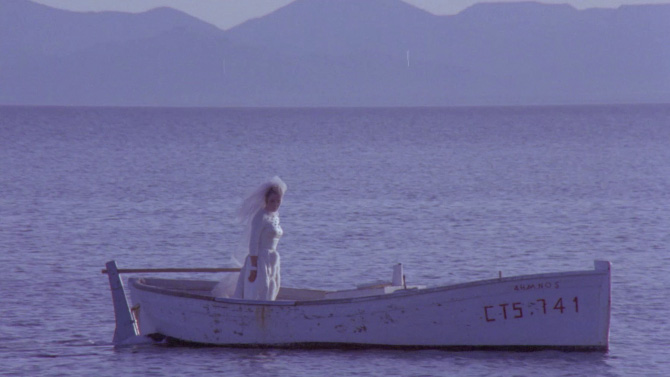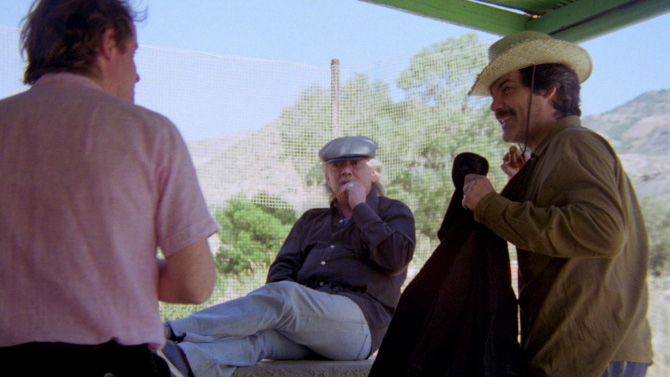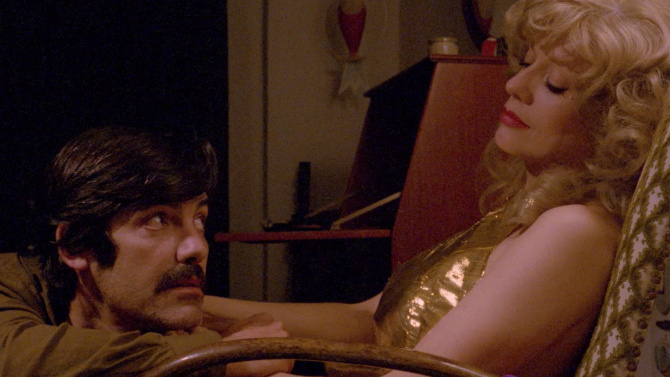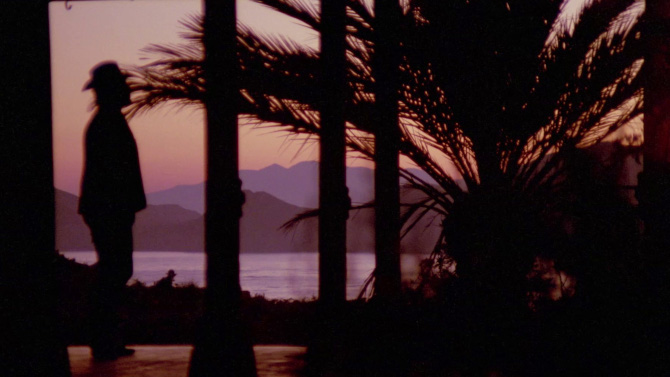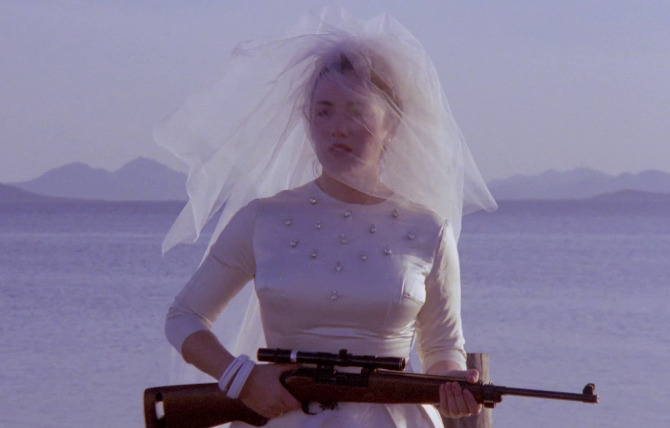It is always an intriguing prospect to watch the one film that doesn’t fit into a genre film maker’s oeuvre. For The Master of Suspense – Alfred Hitchcock, it was the screwball comedy Mr. and Mrs. Smith (circa 1941 – no, he was not alive to direct the Brad Pitt/Angelina Jolie vehicle in 2005), for Martin Scorsese, the master of the crime movie, it has to be the children’s film Hugo, and for Jesús Franco, the creator of stylish exploitation B pictures packed with sex and violence, 1984’s Bahía Blanca fits the bill.
The master of pumping them out fast, this was Franco’s tenth of ten movies made in 1984. . . a time when the independent industry was losing their avenue with exploitation flicks (and Franco’s famous touch of softcore was being eliminated by cinema being divided into either adult or mainstream), as Hollywood was learning how to create higher budget slasher flicks that blew these little pictures out of the water – meaning that, the writer/director found himself self-producing a lot of his own films (often disappearing or finding their way onto sub-par VHS – like this rarely seen picture).
A character driven drama with crime aspects, Bahía Blanca is a seemingly idyllic village on an inlet in Spain. . . though all is not as it seems. With a body washing up on the shore (one of the thugs from the local criminal syndicate), Inspector Carlos Fernández (Antonio Mayans), an officer who always dresses casually and never seems to take his job too seriously, is on the case.
With a population of 701, there aren’t too many places to look. An oracle-like wanderer known as El Miserias (Franco appearing in his own movie) constantly spouts warnings to a number of community members, and talks about the sirens that live on nearby Deer Island. . . a place where men find themselves led astray by what they discover. The Inspector decides to investigate.
With the island originally home to a happening bar and brothel, the shipping routes having changed (the theme of the changes of modernity often play a part in these 70s and 80s independent films), now only Alida (Eva León) and her mute sister María (Lina Romay – Franco’s muse and most frequent collaborator. . . they lived together from 1980 on and finally married in 2008), live on the deserted island. Having fled a rather precarious situation, Alida has the task of keeping her fragile sister safe from the sexually charged clientele, while servicing the men and running a bar to keep them afloat. Funnily enough, when the Inspector visits the locale, we quickly learn that he and Alida are very old acquaintances with quite the back story.
Another storyline finds a young woman, Silvia Maderos (Analía Ivars), excited to marry Andy (José Llamas), much to the chagrin of her father (Trino Trives). A wise longtime resident of the community, he knows that Andy is a violent thug for mob boss Raul Sebastián (Antonio Rebollo) – the most dangerous man in the inlet. Despite her father’s stern form of guidance, she is enamored with the man and will not let him go.
The sea, a symbolic separator of the characters in this story, finds these people listlessly traversing its water, looking for some sort of connection. With a melancholic essence, every character is, at their core, unhappy. The Inspector wants more, but is a shallow man, who, despite looking for someone, is unwilling to commit. Alida, who spends most of her time (sexually) with both the Inspector and mobster Raul, missees the former as a possible beau and the latter as a financial and gift-giving dynamo. . . yet, together, tensions flare over the comely woman. Meanwhile, María, constantly misunderstood, is hampered by her sister. . . old enough to find love, yet due to her inability to speak, often finds wayward men pursuing her for all the wrong reasons (hence her sister’s constant vigilance). Silvia, with all of her innocence and stubbornness, will find her own sorrows in life. . . adding another lost soul to the list of this utterly beautiful yet unhappy town.
A visually stunning motion picture, Franco’s Bahía Blanca is chock full of ocean vistas. . . silhouettes adding mood at both dusk and dawn, lengthy takes of the bountiful nature found where land meets sea, dramatic zooms that help push the story forward, and an all-round picturesque aesthetic. It is surprisingly well done for a movie that has barely been seen. . . a slow-burner of a character drama with tinges of crime (and, it wouldn’t be a Franco film without at least a little bit of nudity). You really get the sense that this project meant something to him – a sort of passion project that likely helped him work through some of his own varied emotions and numerous mid-life problems as his career was beginning to fizzle out. A last noteworthy mention – it is hard to believe that Quentin Tarantino has never seen this. . . for Silvia wielding a rifle in her jarringly white wedding dress is a striking piece of visual cinema that immediately draws the mind to his two Kill Bill movies. So, be swayed by the call of the siren and see this unknown Indie gem, it gives new meaning to a shotgun wedding.
This film is in Spanish with English subtitles

